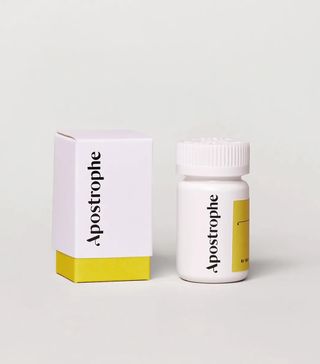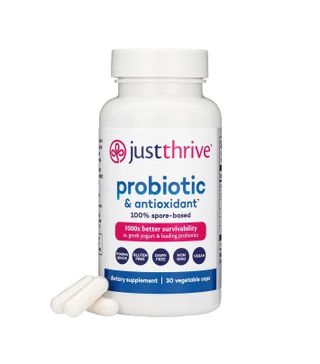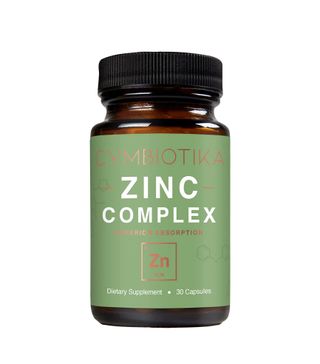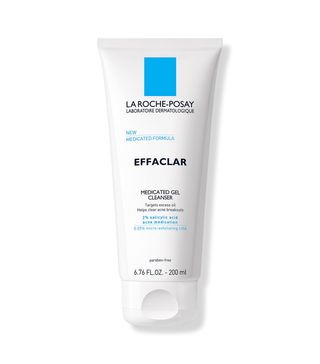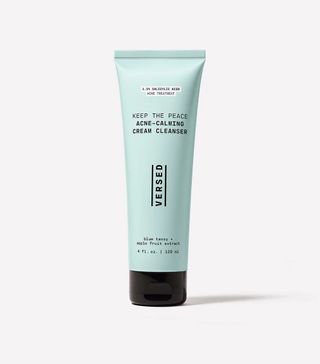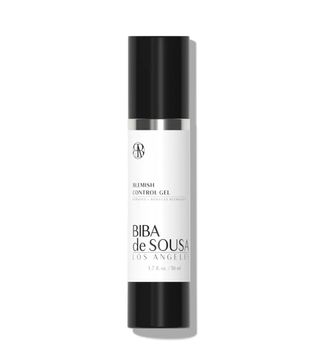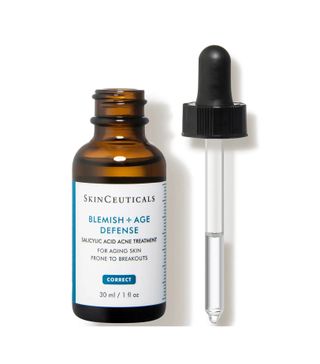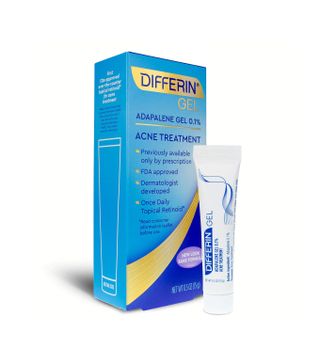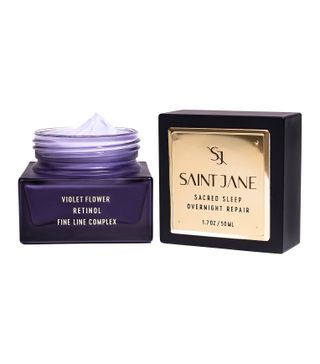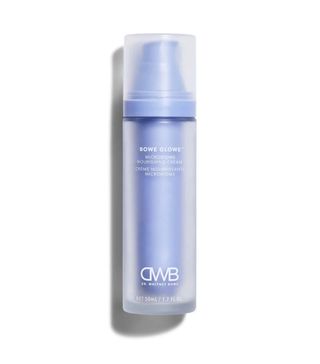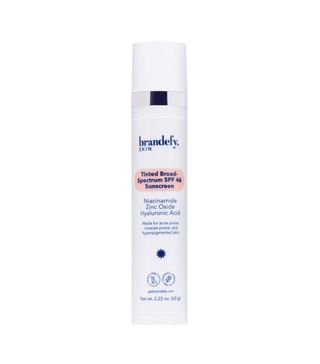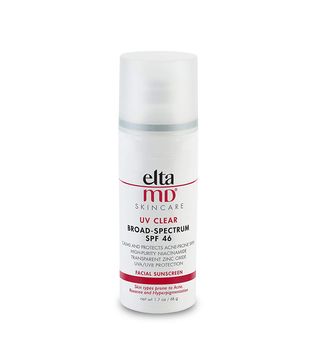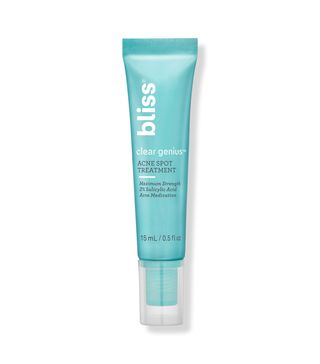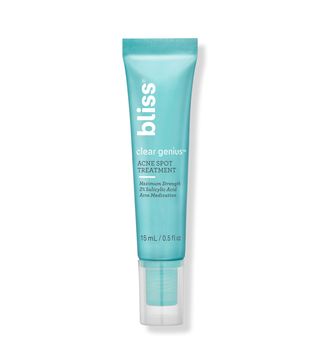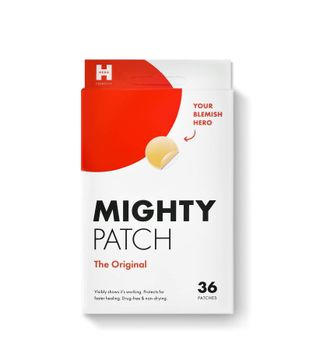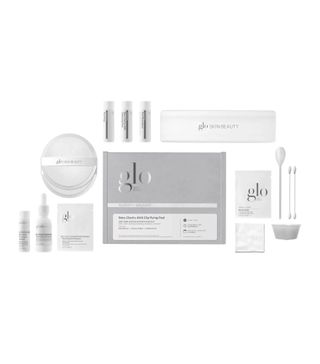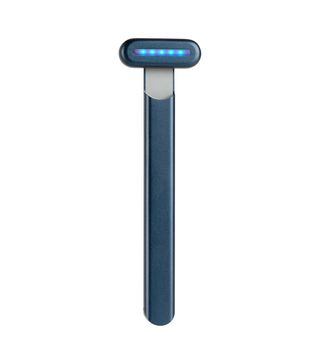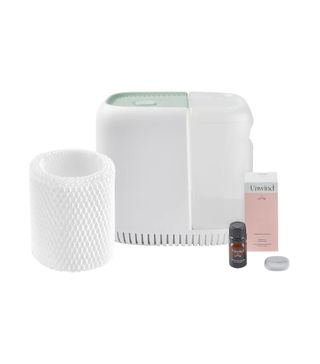These Are the Only Products You Need to Control Hormonal Acne
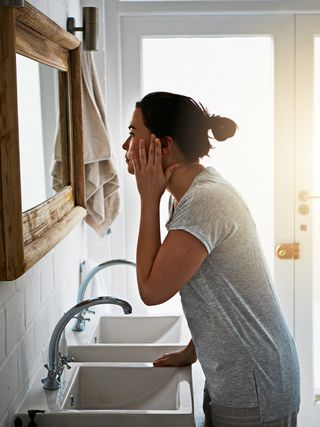
While the appearance of acne on the skin can be crippling to one's self-esteem, it is an outward reflection of what is happening inside the body. If you've noticed acne rearing its head on the lower part of your face, particularly around the jaw and cheeks, you're likely experiencing hormonal acne. "Hormonal acne tends to appear on the lower part of the face as blackheads, whiteheads, and cysts. While it can be due to genetics, several environmental factors can trigger hormonal acne," affirms Dendy Engelman, MD, FAAD, certified dermatologic surgeon at the Shafer Clinic Fifth Avenue in New York.
This form of acne is due to excess estrogen and testosterone being improperly expelled from the body. This buildup "can lead to oiliness on the skin and cause breakouts," details Nina Desai, MD, FAAD, of Pure Dermatology & Aesthetics in Manhattan Beach, California.
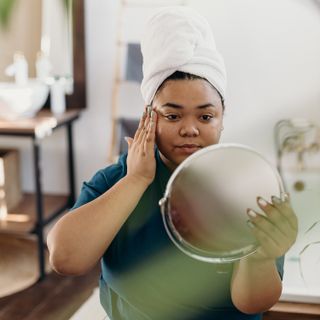
Men and women can experience hormonal acne, but it is often prevalent in the latter. Fluctuations in hormone levels at pivotal points in women's lives, including postpartum and menopause, are when this type of adult acne is present. There are also instances, like polycystic ovarian syndrome (aka PCOS), that catalyze hormonal acne.
Treating hormonal acne doesn't have to include hormone intervention, despite what the official terminology for this type of acne implies. In fact, Engelman stresses that "lifestyle changes and the utilization of suitable skincare ingredients often reduce inflammation and breakouts." Avoiding inflammatory foods that exasperate blemishes, limiting your exposure to UV rays and pollutants, plus restoring your gut health will work in tandem with clinically proven ingredients to clear the skin.
If you're ready to overhaul your skincare routine and make tweaks to your daily routine, take a look at the best products for hormonal acne below.
Supplements
"Spironolactone is a potassium-sparing diuretic that works as a mechanism of action to block the hormonal effects leading to acne," explains Engelman. This medication is prescribed by dermatologists or primary care doctors, with brands like Apostrophe working to democratize the space and create easier access to certified providers.
"Probiotics are a great way to support the gut flora, which helps to balance the skin microbiome and aid in decreasing acne breakouts," states Engelman. Just Thrive's daily spore-based probiotic was expertly formulated to survive the journey through the digestive system to ensure all three billion spores make it to the gut. The company's proprietary blend contains a patented strain called Bacillus indicus HU36, which offers antioxidants to your microbiome. The pill is gluten-, dairy-, soy-, and corn-free, making it an instant editor favorite.
"Vitamin supplements can help with hormonal acne through their antioxidant effect by reducing inflammation and promoting hormonal balance," details Desai. She continues to remark zinc as a supplement on her must-have list, but only if you are not reaching your daily recommended intake through food. Too much of any vitamin or mineral can cause more harm to your system than good.
Cymbiotika is another editor-approved brand, with bioavailable formulas that are easy to introduce into your routine.
Cleansers
Properly cleansing the skin is one of the first steps in any skincare routine, not just ones that are acne focused. Most cleansers on the market can strip the skin of its natural oils, resulting in increased sebum production and triggering acne. Engelman recommends washes that include barrier-restoring ingredients like glycerin to retain skin moisture. She calls the Effaclar Medicated Gel Cleanser from the beloved French brand La Roche-Posay a staple.
Versed, widely known for formulating effective skincare without sacrificing environmental and ethical standards, offers an acne cleanser that is perfect for those with sensitive skin. Harnessing the power of anti-inflammatory blue tansy and the mild exfoliant of apple fruit extract, it cleanses skin without stripping it of its natural oils. The star of the show, however, is salicylic acid, a beta hydroxy acid that bypasses the skin's epidermis to travel deep into the pore to eradicate impurities.
Serums
Benzoyl peroxide is one of the top dermatologist-approved picks for treating all kinds of blemishes, not just hormonal forms. "Benzoyl peroxide effectively penetrates deep into the pores to absorb excess oil and maintain hydration within the moisture barrier," explains Engelman. Studies have shown that in concentrations as low as 2.5%, this ingredient can steadily improve acne. The Biba de Sousa Los Angeles Blemish Control Gel is a personal recommendation that has been a mainstay in my hormonal acne journey. The gel-like texture absorbs quickly without irritating the skin or compromising barrier function.
Harnessing the power of salicylic acid, the Blemish and Age Defense serum from SkinCeuticals tackles inflammation and excess sebum buildup in the pore while easing things like fine lines. This serum is thinner in texture, with quick absorption and an easy application. Another standout ingredient in the formula includes dioic acid, which works like salicylic acid to control sebum production and refine pores.
"Topically, I love retinoids, such as over-the-counter Differin gel. These products will maintain the skin quality, fight blackheads and whiteheads, and leave the skin feeling less oily overall," reveals Desai. Retinoids can sensitize the skin if overused, so be sure to use this topical once daily, preferably at night, since it makes the skin photosensitive.
Moisturizers
Desai emphasizes to her patients that including a retinoid at night to maintain cell turnover and improve clogged pores is nonnegotiable. Her favorite is the Sacred Sleep Overnight Repair from Saint Jane Beauty. While the product is marketed for aging skin, the increase in skin cell turnover rate is why Desai suggests it in her practice. The formula also includes CBD, which decreases inflammatory responses in the skin, typically seen in individuals with acne.
A compromised skin barrier will result in acne—including hormonal—and skin conditions like eczema, rosacea, and psoriasis. Anyone concerned with overall skin quality should try incorporating reparative creams into their nightly regimens. Dr. Whitney Bowe's core product, the Microbiome Nourishing Cream, has been clinically proven to balance the skin's microbiome while promoting luminous, clear complexion.
Sunscreen
When asked what we should do to prevent hormonal acne, Engelman stresses the importance of sunscreen. "UV exposure can cause inflammation, so it is important to apply sunscreen before leaving your house and reapplying every two hours," she details. This option from Skincall offers zinc oxide, niacinamide, and hyaluronic acid. These ingredients work in tandem to boost hydration and repair uneven skin tone while protecting against inflammatory UV rays.
The EltaMD UV Clear Broad-Spectrum SPF 46 is beloved by dermatologists, aestheticians, celebrities, and wellness experts for a good reason. This ultra-lightweight, oil-free SPF contains powerhouse ingredients such as hyaluronic acid, lactic acid, niacinamide, and vitamin E, all of which repair and restore the skin. And while you won't find any fragrances or good-for-you essential oils here, you will find indisputable protection from the sun from a formula that is quite easy to reapply throughout the day.
Devices and Treatments
Spot treatments can be lifesavers for deep cystic blemishes as a result of imbalanced hormones. Engelman reaches for the Bliss Clear Genius Acne Spot Treatment because it can "reduce inflammation and redness while accelerating the healing process from long-term scarring."
The Skinfix Acne+ Spot Treatment uses derm-approved salicylic acid at 2% and the underrated ingredient azelaic acid at 10%. Studies have shown that azelaic acid can effectively treat non-inflammatory and inflammatory acne when used twice daily. It is also an optimal selection for anyone who wants to treat hyperpigmentation but has sensitivities to other antioxidants like vitamin C.
Hydrocolloid patches shrink the size and height of a blemish by absorbing excess sebum, bacteria, and impurities trapped deep inside the pore. These low-maintenance treatments are best used at night because they require six to eight hours to work their magic on the skin.
"Glo Skin Beauty's Beta-Clarity AHA Clarifying Peel offers pro-level exfoliation by removing excess oil that often causes breakouts. This at-home peel kit infuses salicylic acid with vitamin C to slough away dead skin cells, purify pores, and promote cell turnover," expresses Engelman. Since this is more intense than other at-home treatments, it is important to hold off on using other exfoliants for a few days before and after use. This will keep you from overworking the skin, which might result in irritation or more acne.
Recent studies show topical red and blue light therapies can effectively be used to treat stubborn forms of acne. While Desai speaks highly of in-office treatments like the laser/light therapy treatment Forever Clear BBL by Sciton, it isn't easily accessible for everyone. Companies like Solawave, with its Blue Light Acne Treatment Wand, can help. This device combines three skincare devices, with the blue light at 415nm being the primary acne eliminator. Other benefits include low vibrations to massage the skin, decreasing puffiness, and therapeutic warmth to support luminous skin.
Engelman and I sing the praises of humidifiers, particularly this option from Canopy. "The Canopy Humidifier is my go-to because it's clean, mold-inhibiting, and mist-free, which means that it doesn't release allergens or contaminants into the air as many traditional humidifiers do. This makes it excellent for hydrating all skin types without the risk of causing additional irritation. It also increases topical efficacy for skincare products," she says. To her point, a weak skin barrier means that impurities, bacteria, and other pro-acne triggers can lodge into the skin, resulting in acne that is hard to treat, including hormonal forms.
Next, 9 Foods That Are Making You Break Out (and What to Eat Instead)
Disclaimer
This article is provided for informational purposes only and is not intended to be used in the place of advice of your physician or other medical professionals. You should always consult with your doctor or healthcare provider first with any health-related questions.
